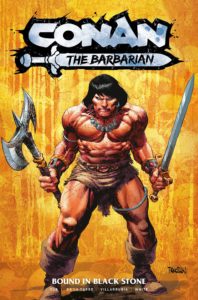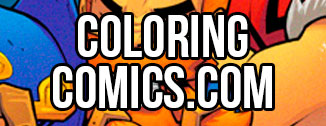Almost 12 years ago, I posted up a critique I gave someone on a pitch package I was sent because I felt that the feedback covered a lot of common mistakes I see and could help other people as well.
Recently, one of my former students reached out to get feedback on an animated series pitch concept they’d been working on and, in a similar vein, asked for unvarnished critique. I don’t normally have time for one-on-one feedback, but they’re a former student and, as soon as I looked over the presentation they’d put together, I could see a lot of fundamental issues and they needed a wake up call.
So…here’s what I sent them, with story and character specifics removed, so people who read my blog here can benefit from it too:
• First impressions are extremely important. The first slide of this presentation needs a logo that reinforces your story. That logo needs to stand out along with a piece of art that immediately engages the viewer. A bland font and a rough character head sketch is not the first impression you want to make.
• When coming up with a title, you need to do research and make sure it isn’t already being used elsewhere. [Specifics about how their title is too close to something that already exists], and a studio will not want a story that is only one letter different from that.
• Your core idea is quite generic and has been done many times before. A great story twist or an extremely engaging art style could help elevate it beyond that generic foundation and grab some attention, but you don’t have either of those things in your pitch package right now.
• The stakes in your summary are much too vague. The “fate of humanity” sounds dramatic, but also feels impossible to measure. In many ways, smaller and clearer stakes can work better than vast “the world is in danger” stuff, especially at the start of a story.
• Do not try to pitch multiple seasons right from the start, especially as someone with no prior experience running a show. Make an incredibly compelling first season concept that works on its own and generate interesting story threads that can be pursued for a possible second season.
• Your description of technology doesn’t make sense and isn’t consistent. You need to be much clearer in terms of the tech level involved and how this setting is similar or different from our modern world.
• What is the name of this place? Is it an existing city we know or a completely fictional world? “A massive city” is not good enough and doesn’t feel interesting. It’s too vague.
• Something that can “change the course of history and the fate of humanity” might be a secret for your audience, but it’s not something you can hide from the people you want to approve and bankroll your show. If you have a really cool story twist, you need to tell us right in the pitch, otherwise it’s just hollow promises. A producer will see right through it and call you on your BS or reject the pitch outright.
• Again, the stakes feel much too vague. What are the main character’s goals, short term or long term? Is the main character doing this for their family or just for their own ego? Is there an immediate need for this fame or money that makes any of this interesting or compelling right now?
• Why do you have concept designs for secondary characters before designs for the main character? These slides need to be presented in a logical order.
• The sizing and silhouettes on most of the characters are too similar, especially when we see them all together in the line up. Their standing poses do not convey any sense of personality. Most of the clothing is quite generic and does not visually stand out.
• The character expressions look okay, but the body posing is extremely bland. Characters just standing around tells the people you’re pitching to that characters in the show are just going to be standing around a lot.
• Your section write ups need to be shorter and more focused. Imagine an executive sees these slides projected on screen during a live pitch session. Are they going to spend time reading a bunch of tiny text? Not a chance.
• You have some sentences in present tense and others in past tense. Also, there should not be any spelling or grammatical errors. Your writing needs to be completely professional to help convince the executives you pitch to that this idea is worth investing in.
• Ideally, the writing should also give us a sense of personality and draw us into this fictional world. Your writing is not clear enough and doesn’t convey any feeling about the world or the characters.
• You are pitching an entire season of a show but only have a synopsis of the first episode? That will not cut it. You describe the start of the episode in too much moment-to-moment detail and then rush through the second half instead of describing it all in a compelling and consistent way.
What is the inciting incident that makes the beginning feel important and amazing? What kind of compelling surprise or cliffhanger can you create that pushes the audience to need to see episode 2 and beyond? There is nothing that happens in this first episode that your main character can’t just back out of and go back to their regular life. There is nothing special about this day or moment to grab our attention.
• Your biography is too long and doesn’t come across as confident or focused. You can’t just tell a company you have a lot of ideas, you have to prove that those ideas are better than anything they could come up with on their own. Do you have a website with a portfolio of other work? Do you have experience on other projects or films?
• None of the concept art is finished so, in turn, the concept doesn’t feel properly fleshed out. Why should a company spend thousands, possibly millions of dollars, when you can’t even give them a clear vision of what this story might look like?
I know the above points are harsh, but I need you to understand that this isn’t just about getting a passing grade on an assignment anymore. If you want to compete in a professional environment, especially if you are looking to lead a production, expectations are way, way higher.
In its current form, none of this pitch package is ready. If you want to make a stronger impression, you need to reevaluate and overhaul every aspect of it.
Transitioning from student work to professional output can be extremely tough, especially when you’re trying to jump into a leadership role by pitching a brand new project.
The only way to get better is to build things, finish them, learn from the experience, and then keep building, over and over.
If you found this post helpful, feel free to let me know here (or on Twitter), share the post with your friends, check out other tutorial posts I’ve written (including a whole series of articles on pitching), or sign up for my email newsletter.





 Zub on Amazon
Zub on Amazon Zub on Instagram
Zub on Instagram Zub on Twitter
Zub on Twitter
This is a wonderful list! Thank you!
I clicked especially with “What is the name of this place?”
In my series I have a “Dark Forest” and although is the only place named like that I think I can add a local elder name so I can change between them. I kind of did this for a fortress to show time had passed and people now called it in a different way
Interestingly, swap out a few nouns and a lot of the advice makes sense in a business case or public policy context. I’ve made a lot of pitches in my 40 years – and I’ve learned to be happy one in ten stick. Some good advice here.
Thanks for this Jim! And thanks to your former student too. Some very good succinct advice here that I’ll take to heart.